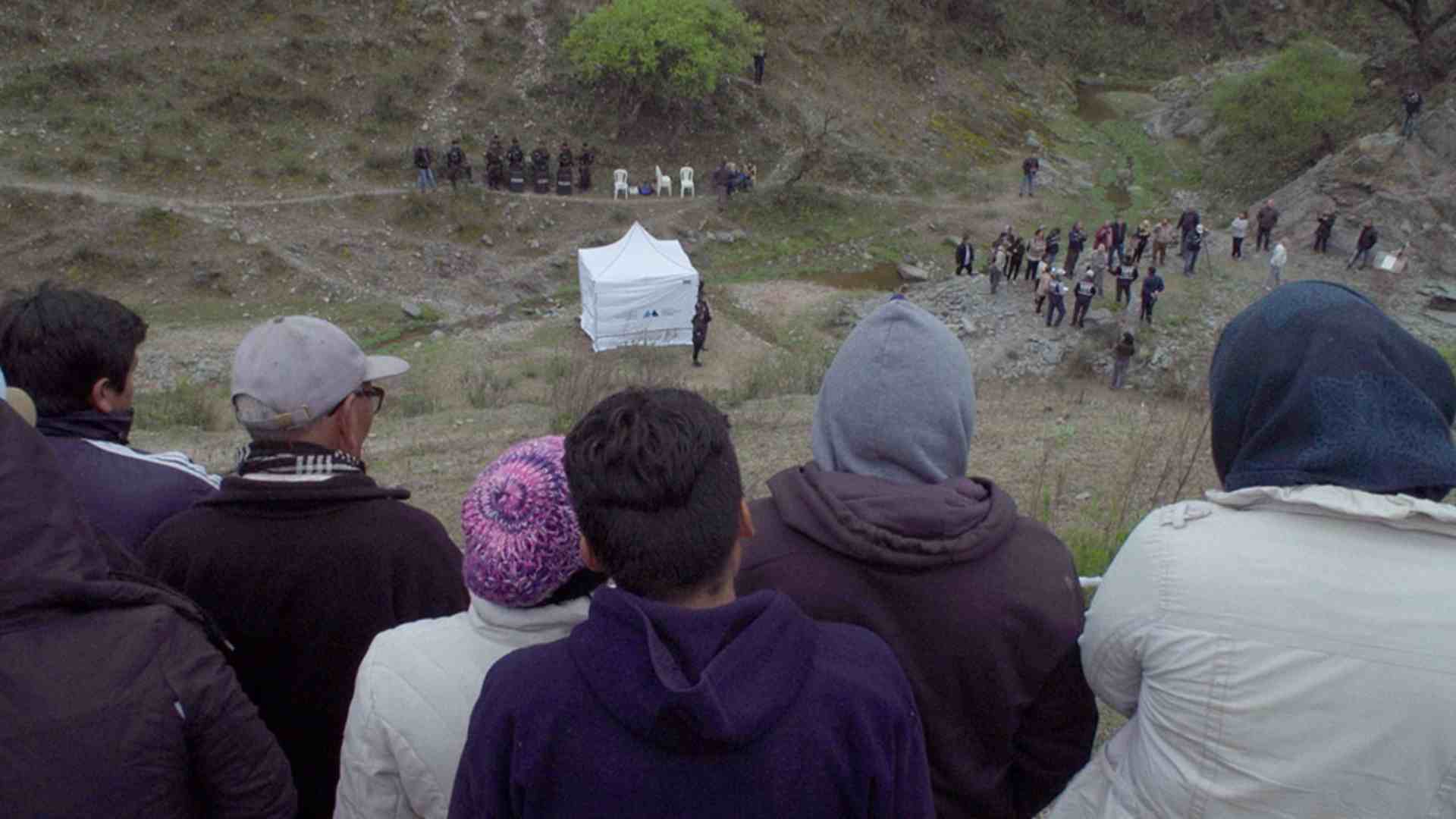In 2009, Javier Chocobar—a leader of the Chuschagasta community, which has resided in the northwest of Argentina for hundreds of years—was killed by Darío Luis Amín, a wealthy landowner embarking on a mining venture vehemently opposed by the tribe. One year later, Lucrecia Martel began working on Nuestra Tierra (Landmarks, previously titled Chocobar), a documentary as much about the 2018 trial over Chocobar’s murder as it is about Argentina’s deep-seated contempt for Indigenous communities. While the arrival of her colonial epic Zama in 2017 cemented Martel as one of the most incisive contemporary cineastes as it pertains to the violent legacy of Latin American colonialism, her longstanding work on this film is partially what imbued her with the requisite perspective to make such a scathing condemnation in the first place.
Part procedural, part granular portrait of an increasingly silenced demographic, Nuestra Tierra asserts the global scale of Indigenous persecution from its opening shot. A satellite captures images of Earth before the camera homes in on the lush landscape of rural Argentina, eventually landing amid arid mountain grasses where Chuschagastans play soccer (the invention of which is largely credited to native Mesoamericans). The implication is that this hyper-local case contains far-reaching truths about the eradication of Indigenous populations across the globe, enforced through brutal slayings and legal disenfranchisement alike. The Chuschagasta, self-sustaining through centuries-old agricultural practices, feel rightfully protective over their land, though colonial instruments have long distanced these communities from the land and culture they’ve painstakingly cultivated.
Standing on trial alongside Amín are ex-cops Luis Humberto Gómez and José Valdivieso, Amín’s collaborators who were present when he killed Chocobar. They claim that his death was justified, in part because “the Argentine state trained” them to respond with gunfire, despite the fact that Chocobar and his constituents defended themselves only with sticks and stones. Even when under the scrutiny of the courts, mechanisms of the colonists are held in the highest regard: The wrath of God is invoked before each witness approaches the stand; while the defendants have no issue raising their hand to the Christian deity, the Chuschagastans in the courtroom understand the hypocrisy of swearing on the same holy book that continues to fuel their destruction. When they visit a cathedral in a later scene, murals depicting Indigenous people as brutish warlords adorn the walls. “Even God wants to erase us for good,” someone jokes off-screen.
This intent to erase is ingrained in every institution they encounter. A significant reason for the land dispute between Amin and the Chuschagasta stems from a single author’s claim that this community officially went “extinct” in 1807, his evidence being that they do not have a distinct language or exclusive physical traits. A cursory understanding of the Spanish invasion of Latin America reveals a concerted effort to eliminate Indigenous tongues and cultural identity; intriguingly, there’s an infectious national pride among the Chuschagasta and other adjoining communities. They fought in Argentine wars of independence against the Spanish in the early 19th century; Chocobar’s widow shares an anecdotal remark regarding Peronist sentiment among her late sisters. Even now, they march to community events with the Argentine flag in tow.
Several community members share that, in grade school, they were taught the familiar imperialist history: that Christopher Columbus “discovered” the Americas, that proper civilization arrived aboard the Niña, the Pinta, and the Santa María. Despite their acknowledgement of this pervasive indoctrination, a certain loyalty to national institutions nevertheless remains—even if they are constantly reminded that they do not exist to serve them. In a recording presented to the judge, Amín scoffs at a group of Chuschagasta defending their land. “No one at the court listens to them anymore,” he mocks. From the offset, all evidence points to a futile effort, yet even still the community seeks retribution through the state’s channels.
And yet, Chocobar’s widow begins to beg toward the film’s climax: “Is God seeing all of this?” Throughout Nuestra Tierra, Martel employs a caravan of drones to capture the landscape of the Tucumán province, a choice that could easily emulate the cheap cinematography of true-crime in the hands of a less assured filmmaker. Here, though, it’s used for greater purposes; in fact, it appears at one point that a divine entity is very much aware of—and perhaps equally enraged about—the greed that has come to scourge the land and the native people that inhabit it. As a drone flies overhead, documenting the sweet yet solemn faces of horses down below, a raptor screeches as it barrels toward the camera, sending it crashing down. Nature is in revolt.
About an hour into Nuestra Tierra, Amin’s defense directly addresses Martel’s camera, accusing the film crew of making a “circus” of the trial. Although the judge firmly denounces this claim, arguing that journalists have the right to document what’s occurring in the courtroom, Martel responds by retreating into the intricacies of Chuschagasta history and quotidian life for the next 30 minutes of the film. When she finally returns to the case, the resultant conclusion provides little catharsis. No matter how severe the penalty, no modicum of justice can be retroactively served when the struggle for self-preservation continues for this community and countless others. Yet even amid the indignation, perseverance prevails: Chocobar’s 22-year-old nephew Alberto Catá, a key witness in the trial, traverses the country’s rugged hills, choosing a plot to construct a house for his future family—deeds and their owners be damned.
Director: Lucrecia Martel
Writer: Lucrecia Martel, María Alché
Release Date: September 8, 2025 (TIFF)

 Keep scrolling for more great stories.
Keep scrolling for more great stories.
